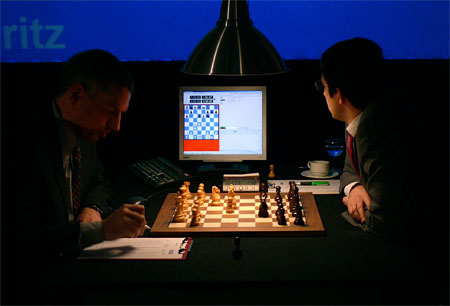slobo wrote:Perhaps a 2300 engine, because we should not forget that Vas is a talented programer.Robert Flesher wrote:Exactly my point!Alexander Schmidt wrote:Yes, thats true. When he started he wrote a program that was at the 2000 ELO border. It was completely different to the actual Rybka, for example it had MTD(f) search.M ANSARI wrote: when he got started Fruit was not available as source.
Then came Fruit.
Then came Rybka 1.0 Beta, that was _very_ similar to Fruit, and not to former Rybkas.
Without Fruit it appears his engine would still be a 2200 engine. Yet nobody even mentions Fabien as the true genius.
Vas Rajlich Video...
Moderator: Ras
-
Dr.Wael Deeb

- Posts: 9773
- Joined: Wed Mar 08, 2006 8:44 pm
- Location: Amman,Jordan
Re: Vas Rajlich Video...
_No one can hit as hard as life.But it ain’t about how hard you can hit.It’s about how hard you can get hit and keep moving forward.How much you can take and keep moving forward….
-
jdart
- Posts: 4420
- Joined: Fri Mar 10, 2006 5:23 am
- Location: http://www.arasanchess.org
Re: Vas Rajlich Video...
That is a good point. Another factor I forgot to mention: Amazon actually is charging more per CPU unit than Vas is proposing to charge. So to make his model work at the cost he is indicating he would have to be more efficient at providing remote CPU services than Amazon is, and they have huge economies of scale. So my guess is you will get less CPU power for your dollar than what was indicated in the interview, although as time goes on the cost/CPU unit will decrease.Harvey Williamson wrote: It also presumes you are only interested in running 1 engine at a fast speed. I want to run many engines at their full speed and compare them. Impossible with the Rajlich model.
-
Albert Silver
- Posts: 3026
- Joined: Wed Mar 08, 2006 9:57 pm
- Location: Rio de Janeiro, Brazil
Re: Vas Rajlich Video...
A big 'perhaps' IMHO. There was no mention of remote Rybkas until Robbo came out. I thought the whole remote Rybka idea was simply to put an end to the rampant code-stealing while still being able to earn a living.jdart wrote:It is an interesting point that, while not the primary motivation for Vas apparently, this model also prevents reverse engineering and piracy.
--Jon
"Tactics are the bricks and sticks that make up a game, but positional play is the architectural blueprint."
-
Dr.Wael Deeb

- Posts: 9773
- Joined: Wed Mar 08, 2006 8:44 pm
- Location: Amman,Jordan
Re: Vas Rajlich Video...
That's his side of the story....I have another....Albert Silver wrote:A big 'perhaps' IMHO. There was no mention of remote Rybkas until Robbo came out. I thought the whole remote Rybka idea was simply to put an end to the rampant code-stealing while still being able to earn a living.jdart wrote:It is an interesting point that, while not the primary motivation for Vas apparently, this model also prevents reverse engineering and piracy.
--Jon
Dr.D
_No one can hit as hard as life.But it ain’t about how hard you can hit.It’s about how hard you can get hit and keep moving forward.How much you can take and keep moving forward….
-
Rolf

- Posts: 6081
- Joined: Fri Mar 10, 2006 11:14 pm
- Location: Munster, Nuremberg, Princeton
Re: Vas Rajlich Video...
Hi,Milos wrote:Talented MIT programmer, please don't forget that, otherwise our Rofl will be sad...slobo wrote: Perhaps a 2300 engine, because we should not forget that Vas is a talented programer.
for years I had just 1 correspondent from Yugoslavia after I had contact with Prof Djordje during the bombings of Skopje, called Slobo. Look, if you play chess, I will ask the authorities that we could play some games once every week.
Rado regards, Rolf
Slobo, would this be allowed? Just yes or no.
-Popper and Lakatos are good but I'm stuck on Leibowitz
-
shiv
- Posts: 351
- Joined: Sat Apr 01, 2006 2:03 am
Re: Vas Rajlich Video...
It might prevent piracy but passes "piracy"-like problems to the users.Albert Silver wrote:A big 'perhaps' IMHO. There was no mention of remote Rybkas until Robbo came out. I thought the whole remote Rybka idea was simply to put an end to the rampant code-stealing while still being able to earn a living.jdart wrote:It is an interesting point that, while not the primary motivation for Vas apparently, this model also prevents reverse engineering and piracy.
--Jon
The idea of remote Rybka is that strong players can use a stronger Rybka for say 1000 Euros a year. One really strong players can benefit from this, elo > 2700 for sure. People less than 2600 elo for example do not often have the technique and time management skills to convert a slight advantage (say a 0.50 rybka advantage).
The fatal flaw however is that the same players rated over 2700 are very paranoid about their analysis and would not trust a server to reply to their moves. Why not? There are at least 2 issues:
1. Any request to the analysis server and its results will be known by Vas and his team and thus their analysis would not be secret.
2. Hackers can figure out which positions are most topically analyzed on servers. Thus, the connection to the server has to implement SSL, which means that chessbase or a special rybka client has to be introduced.
The above may seem like paranoid arguments, but remember the players are over 2700 and their livelihood strongly depends on their analysis. I recall the story of a famous GM who was scared to leave behind his laptop in the hotel room because he was scared that his analysis will be known to other competitors (he actually did not care about the laptop's value).
I think a simpler idea would be to investigate ways to protect software such as self-modifying code which implements checksums at random locations in the code. There are related techniques which makes life really hard for a hacker.
-
Dr.Wael Deeb

- Posts: 9773
- Joined: Wed Mar 08, 2006 8:44 pm
- Location: Amman,Jordan
Re: Vas Rajlich Video...
Actualy it's a rock solid and valid argument....thanks for pointing this outshiv wrote:It might prevent piracy but passes "piracy"-like problems to the users.Albert Silver wrote:A big 'perhaps' IMHO. There was no mention of remote Rybkas until Robbo came out. I thought the whole remote Rybka idea was simply to put an end to the rampant code-stealing while still being able to earn a living.jdart wrote:It is an interesting point that, while not the primary motivation for Vas apparently, this model also prevents reverse engineering and piracy.
--Jon
The idea of remote Rybka is that strong players can use a stronger Rybka for say 1000 Euros a year. One really strong players can benefit from this, elo > 2700 for sure. People less than 2600 elo for example do not often have the technique and time management skills to convert a slight advantage (say a 0.50 rybka advantage).
The fatal flaw however is that the same players rated over 2700 are very paranoid about their analysis and would not trust a server to reply to their moves. Why not? There are at least 2 issues:
1. Any request to the analysis server and its results will be known by Vas and his team and thus their analysis would not be secret.
2. Hackers can figure out which positions are most topically analyzed on servers. Thus, the connection to the server has to implement SSL, which means that chessbase or a special rybka client has to be introduced.
The above may seem like paranoid arguments, but remember the players are over 2700 and their livelihood strongly depends on their analysis. I recall the story of a famous GM who was scared to leave behind his laptop in the hotel room because he was scared that his analysis will be known to other competitors (he actually did not care about the laptop's value).
I think a simpler idea would be to investigate ways to protect software such as self-modifying code which implements checksums at random locations in the code. There are related techniques which makes life really hard for a hacker.
Dr.D
_No one can hit as hard as life.But it ain’t about how hard you can hit.It’s about how hard you can get hit and keep moving forward.How much you can take and keep moving forward….
-
mschribr

- Posts: 223
- Joined: Thu Mar 09, 2006 4:23 am
- Location: new york ny usa
Rybka vs deep blue
Did anybody notice what Vas said about Rybka vs deep blue? He was asked if Rybka 4 on a quad would beat deep blue. He answered that Rybka 1 would beat deep blue. He said it at about 49 minutes 12 seconds.Steve Maughan wrote:In case anyone missed this interview ...
Thanks Steve for posting the link for the interview. I also enjoyed it.
Mark
-
IanO
- Posts: 499
- Joined: Wed Mar 08, 2006 9:45 pm
- Location: Portland, OR
Re: Rybka vs deep blue
*Bracing for switchover from perpetual "RobboLito is a clone" argument to perpetual "Could program X beat Deep Blue" argument.*mschribr wrote:Did anybody notice what Vas said about Rybka vs deep blue? He was asked if Rybka 4 on a quad would beat deep blue. He answered that Rybka 1 would beat deep blue. He said it at about 49 minutes 12 seconds.Steve Maughan wrote:In case anyone missed this interview ...
Thanks Steve for posting the link for the interview. I also enjoyed it.
Mark
(BTW: the interview is now also on YouTube in seven segments. Search for "Vasik Rajlich".)
-
Alexander Schmidt
- Posts: 1235
- Joined: Thu May 10, 2007 2:49 pm
Re: Vas Rajlich Video...
Not really. I heard not much factual opinions about this, just insults and attacks.michiguel wrote: Again?
This was discussed ad nauseam.
Miguel
I asked Uri for his opinion how likely it is that two UCI engines have the same UCI output. As he knows the UCI protocol very well, I am interested in his opinion.
Thats what a discussing board is made for...